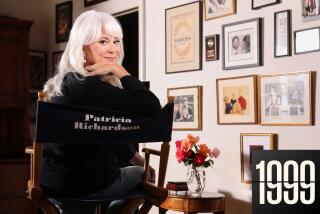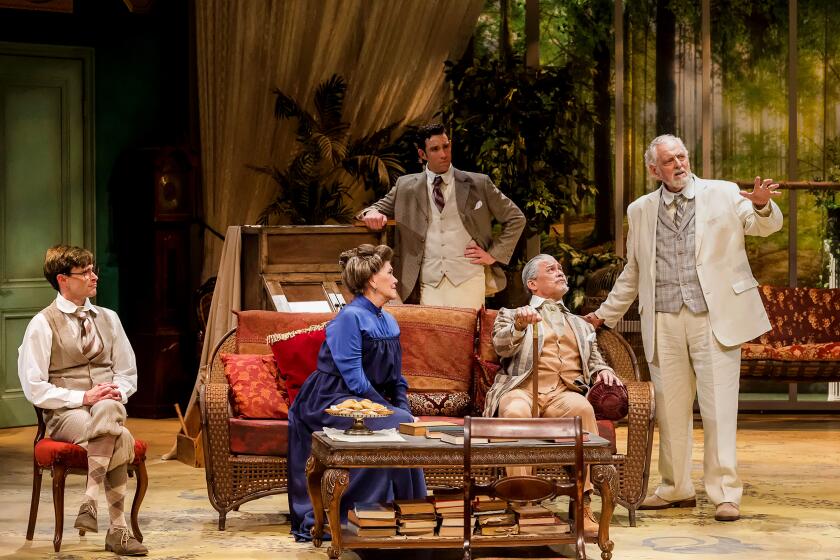O.C. MUSIC / CHRIS PASLES : Biblical Tragedy Will Bring Composer Out of Shadows
Composer Giacomo Carissimi must have been something of a young hotshot in his day--which was 300-plus years ago. He was appointed maestro di cappella, the head music man, at the German College in Rome when he was 24. The institution was a center of Jesuit training and one of the hubs of influence in the Counter-Reformation. As the priests fanned out through Europe, Carissimi’s musical influence spread, too.
Even so, he is something of a shadowy figure.
We know he was born in 1605 and that he become a priest in 1637. We know he kept his college post until the end of his life, even turning down attractive offers from other cities in Italy and the Netherlands. We know he died--in 1674--fairly well off, considering the estate he distributed in his will.
But all of his original manuscripts have been lost. (His music survives in copies). The portrait once thought to be of him turns out to be of someone else. And his grave was destroyed after the church he was buried in was remodeled.
Considering the expressive power and purity of his music and his enormous influence on making the then-emerging cantata form viable, he scarcely receives sufficient attention today.
*
The final program in the Corona del Mar Baroque Music Festival will make some restitution locally by presenting Carissimi’s oratorio “Jepthe” on Sunday at 4 p.m. at St. Michael and All Angels Church. The title role will be sung by tenor Gregory Wait, the role of his daughter by soprano Amy Kane Jarman.
We do not know why he was drawn to the story of Jephthah, as the name is spelled in the Bible, which is recorded in Judges 11-12. But we can surmise he was taken by the dramatic possibilities.
The son of a prostitute, Jephthah is banished from his homeland, but later recalled to fight against his people’s enemies. He makes a terrible vow that if he wins the battle, he will sacrifice “whatsoever cometh forth of the doors of my house to meet me . . . (as) a burnt offering.”
Festival director Burton Karson picked up the story: “He assumes it will be a servant, but it’s his (only) daughter, and that’s the tragedy.”
The daughter--who is not even named in the Biblical narrative--begs her father for two months delay to “bewail my virginity” upon the mountains. Her father grants them and afterward fulfills his vow.
Handel, too, was drawn to the story, just about 100 years after Carissimi’s setting. Handel’s version, spelled “Jephtha,” was his final oratorio.
*
Handel’s version is much more dramatic, Karson said. “This is more gentle. Its drama is very plain to a listener. It’s very modest drama--early Baroque--but it’s just as moving, maybe even more so.”
“The piece ends not with the death--the sacrifice, but with the very, very sad aria by Felia, the daughter, as she’s called. She laments that she will die a virgin: not that she will die, that’s not the tragedy, but that she will die unfulfilled. Then comes the final chorus, which is a lament, ‘Weep, Children of Israel.’ ”
“Our chorus was practically in tears at the end of that final chorus--just in rehearsals,” Karson said. “They could hardly believe how wonderful it is.”
Scored for four vocal soloists, chorus and “simple continuo,” the oratorio lasts about 20 minutes. “But there’s a lot of variety from alternating the soloists,” Karson said.
The chorus will be singing the work in the original Latin, but a translation will be provided.
The Carissimi cantata will be followed by Brahms’ unaccompanied motet, “O Heiland, reiss die Himmel auf”; Bach’s cantata No. 70 (“Wachet! Betet!”), and two works by Purcell--the Sonata for Trumpet and Strings and the verse anthem “O sing unto the Lord a new song” (Psalm 96).
*Burton Carson will conduct Giacomo Carissimi’s “Jepthe,” Bach’s Cantata No. 70 and works by Purcell to close the 13th annual Corona del Mar Baroque Music Festival on Sunday at 4 p.m. at St. Michael and All Angels Episcopal Church, 3233 Pacific View Drive, Corona del Mar. Soloists include soprano Amy Kane Jarman, countertenor Brian Asawa and tenor Gregory Wait. $20. (714) 760-7887. *
PACIFIC ON RECORD: The Pacific Symphony will make its first recording in seven years when conductor Carl St.Clair teams up with soloist Alain Lefevre in John Corigliano’s Piano Concerto for KOCH International Classics.
The compact disc will be recorded on Feb. 4 and 5, following performances of the concerto on Feb. 2 and 3 at the Orange County Performing Arts Center. Additional works on the disc will be announced.
The recording will cost the Pacific approximately $80,000, according to executive director Louis Spisto. Money will come from the current endowment campaign and fund-raising by the board of directors.
KOCH, an independent distributor of classical recordings, will pay marketing, distributing and production costs, estimated at about $80,000. The company was founded in 1987 in New York by German lawyer Michael Koch.
Plans for additional recordings will be announced as funding becomes definite, Spisto said. The orchestra hopes to make at least three recordings over a three-to-five year period, he said.
The Pacific’s last recording was a 1987 compact disc for the Pro Arte label. It was a recording of a live performance of music by Berlioz, Strauss and Respighi, at the center in October, 1986, with the orchestra led by its founder, Keith Clark.
*
GIFT PIANO: Orange Coast College’s music department received an anonymous gift of a Yamaha grand piano. A donor purchased the instrument at a public sale last weekend and then turned it over to the college. It will be used by music students and in public performances at the newly refurbished Robert B. Moore Theatre.
More to Read
The biggest entertainment stories
Get our big stories about Hollywood, film, television, music, arts, culture and more right in your inbox as soon as they publish.
You may occasionally receive promotional content from the Los Angeles Times.






